University of Wisconsin–Madison professor and Grinnell alum Morgan Robertson ’93 visited campus this week, presenting his research on the intersection of environmental science and economics. His lecture on Monday, Feb. 10 in JRC 101, titled “The Full-Service Prairie: Managing Commons with the Ecosystem Services Concept,” and his roundtable discussion engaged students and members of the Grinnell community on issues related to market-based environmental protection. His blog is http://wetlandia.blogspot.com/. The S&B’s Joe Wlos ’15 sat down with Robertson to ask about his work with the EPA and his career as a professor.

When you came to Grinnell, were you already interested in environmental issues?
Well, before college, when I was growing up in Iowa, I spent a lot of time in the local parks and the forested areas. I’m really interested in plants, and I have a kind of taxonomic impulse. I want to understand how [nature] is different. I think I just had the idea when I went to Grinnell, ‘I want to be Thoreau.’ I think a lot of Grinnellians have that kind of thought—or John Muir or something—but that romantic impulse succumbs to the reality of having to understand biology and anthropology. Mine really didn’t get derailed. I came to Grinnell thinking about becoming a chemistry major … But I actually dropped out of organic chemistry. It’s the only class I’ve ever dropped out of. I realized at that point that I am very interested in people, and that led to biology and very quickly led to anthropology.
After graduating from Grinnell, you received a Fulbright grant. How did you start that project?
While an undergraduate, I went on study-abroad to Australia … I made a connection with one of the academics who taught some of the classes on the program, and he agreed to be the faculty sponsor to manage the research project I was proposing. The Fulbright was just over a year—about four months of classwork and eight months of field research at a tropical forest research station in North Queensland, Australia. Australia is very much like the U.S. in terms of environmental policy. They’ve been very innovative in market-based environmental policy. I’ve always wanted to go back and study how they did it, and I went back for six months, but then I got a different research grant and had to move on.
What drove you to pursue a Ph.D. in geography from the University of Wisconsin–Madison?
One of the great virtues of geography is that you can study ecosystem science and social concepts of power at the same time. The person who would have advised me at the University of Minnesota [where I received my Master’s] had just retired, and I had a very high opinion of the faculty at Wisconsin, so I applied to move. I received grant funding, so it worked. It’s very odd to be back there as a faculty member at Madison, because that isn’t normally how [academic hir-ing] happens, but I’m very glad. You usually don’t go back to where you got your Ph.D. from.
After your Ph.D., you spent three years working for the Environmental Protection Agency, Wetlands Division. What’s the biggest difference between government and academia?
Speed of results. There’s a certain West Wing-flavor to the work I was doing at the EPA. It was nowhere near that level of drama. But if you’re a wetlands nerd, working in the Wetlands Division of the EPA is like being a football fan and getting asked to work for the commissioner to rewrite the rules of football. That’s what it felt like we were doing! I was asked to work on regulations that govern how we replace wetlands, which is what I wrote my Ph.D. on. Changing the rules of government on how this works was very heady for a small number of geeks that might seem very boring and irrelevant to most people, but if you’re into environmental policy, it’s pretty big. You see things happen very quickly. Something is on your desk one day and on the administrator’s desk the next day. If you’re writing an article in academia, you might see your article in print two years later, or even five years later, if you’re unlucky.
What do you enjoy most about your work now as a professor?
In academia, you can create research that lasts much longer, and you get to advise students who do really interesting things. You can also ask questions that you wouldn’t get to ask every day in government because you need to put out fires.

















































